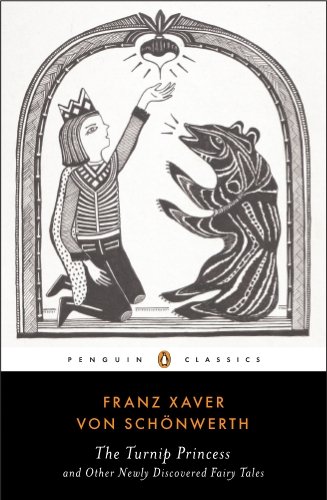The
Turnip Princess
And
Other
Newly Discovered Fairy Tales
By
Franz
Xavier Von Schonwerth
Translated
by
Maria
Tatar
Synopsis
A rare discovery in the world of fairy tales -
now for the first time in English. With this volume, the holy trinity of fairy
tales - the Brothers Grimm, Charles Perrault, and Hans Christian Andersen -
becomes a quartet. In the 1850s, Franz Xaver von Schönwerth traversed the
forests, lowlands, and mountains of northern Bavaria to record fairy tales,
gaining the admiration of even the Brothers Grimm. Most of Schönwerth's work
was lost - until a few years ago, when thirty boxes of manuscripts were
uncovered in a German municipal archive. Now, for the first time, Schönwerth's
lost fairy tales are available in English.
Review
I
grew up cutting my teeth on all the best that the Grimm Brothers had to
offer. The tales from the Black Forest
of Germany and Europe were based on folk legend and tales dating back into the
middle ages and older. I loved the stories of Cinderella, Red Riding Hood,
Rapunzel, and oh so many others. Disney
took these tales and brightened them even more into “Happily Ever After”
stories. What more could any child ever
ask for growing up? It wasn’t until my
adult years when I acquired the complete works of the Brothers Grimm that I
discovered just how dark their version of the old world folk tales truly were.
But
taking these most ancient of oral folk legends and setting them down on paper
so that they would not disappear with time was not limited to the Brothers
Grimm. Back in the mid-1800s, Franz
Xavier Von Schonwerth determined that he didn’t want the folk legends of his
native Bavaria to disappear with time and spent a great deal of time collecting
stories from local sourceand binding them into a collection. Some of those stories have come down through
time, but others just disappeared and no one knew what became of his work until
a few years ago when they were discovered in the attic of a municipal building
in the Bavarian Alps.
With
the translation and release of this new collection, we have been given a
glimpse into fairytales of the region and time that have not been adulterated by
Hollywood or Disney. They are refreshing
and straight forward, with no preambling "Once Upon A Time" to give us hope of "Everafter". He starts right in as an old grandmother or grandfather would in the oral tradition of "There was a boy", or a fox or whatever. In many ways they
remind me of the folk tales that Joe Hayes collected and told of Northern New
Mexico, and that dated back to the 1600’s in their origins. The basis of those same folk tales most
likely having come over with the Conquistadors in the 1600’s from Spain.
Like the nursery rhymes of old, where the farmer's wife cuts off mice's tales with butcher knives, Franz doesn't soften and frill things up and make things pretty and innocent. Life is as life is; hard and harsh, but there are lessons to be learned. We are not talking blood and guts and gore, but life wasn't polished and programed for evening TV viewing until within the last sixty years or so. The New Yorker wrote an interesting article on Franz and his work.
The
Turnip Princess is a read that is a delight for story time with older kids,
but more important, it is a fabulous find for folk literature. It is not just Franz’s ability to retain the
story for posterity’s sake alone, but also his obvious joy in bringing these
tales to life. With the turn of a phrase
and careful attention to his storytelling skills, he makes them dance with
humor and sometimes with a touch of terror.
Hidden
within each of the short stories is a basic moral lesson to be learned. For most folk tales were in fact moral
sermons. The collection is divided into
five different catagories that include:
· Tales of Magic
· Tales of Enchanted
Animals
· Other Worldly Creatures
· Legends
· Tall Tales
· Tales About Nature
The
selection of stories includes titles that capture the imagination.
· The Flying Trunk
· Twelve Tortoises
· Seven With One Blow
· The Toad Bride
· The Prince Dung Beetle
I
have added The Turnip Princess to my
children’s library, as well as consider it a wonderful literary addition to my
world literature collection. The collection is going on the shelf with Aesop’s
Fables, the Brother’s Grimm, Hans Christian Anderson, and Joe Hayes.
The Turnip Princess is scheduled for
release February 24, 2015.
I
give this book a definite FIVE STAR rating
for children’s literature, world folk literature, and just a great fun read. Net Galley provided a copy of The Turnip Princess to Shade Tree Book
Reviews for the purpose of reading and reviewing.
About the Author (from Wikepedia)
Schönwerth
was born in Amberg in the Upper Palatinate, the first of five children of the
royal characters professor Joseph Schönwerth.From 1821 he attended the local grammar school . From 1832 he
studied Cameralism in Munich, 1834 jurisprudence at the Ludwig-Maximilians-University
of Munich . After first working years as a legal intern in 1840
he received a permanent position as Ratsakzessist in the Government of Upper Bavaria . From 1845 on, he was
private secretary in the service of the Crown Prince Maximilian and was after his
accession to the throne in 1848 his cabinet chief. In 1851 he was
Executive Council. In 1852 he moved to the Bavarian Ministry of Finance as
Ministerial and was raised in 1859 in the personal nobility.
Schönwerth
explored 1852-1886 the life of the Upper Palatinate population and recorded his
observations. Between 1857 and 1859 he published his three-volume work
entitled: From the Upper Palatinate - customs and legends. But
published it is only a small part of his extensive research.
 |
| Schonwerth Gravesite |
Grave
of Franz Xaver Schönwerth on his 125th death anniversary
During
his visits in the Upper Palatinate recorded Schönwerth say , fairy tales , anecdotes , kids games , nursery rhymes and - songs and proverbs on. He watched the life in the house and
yard, described the rural life, thecustoms and costumes. He left us on the basis of
his notes a living image of the life of the Upper Palatinate population of the
19th century. Jacob Grimm (1785-1863) wrote of him: ".
Nowhere in the whole of Germany is prudent, fuller and has been obtained so
quiet sense" [
1]
In
1886 Schönwerth died in Munich. His final resting place he found in the Old North Cemetery .



No comments:
Post a Comment